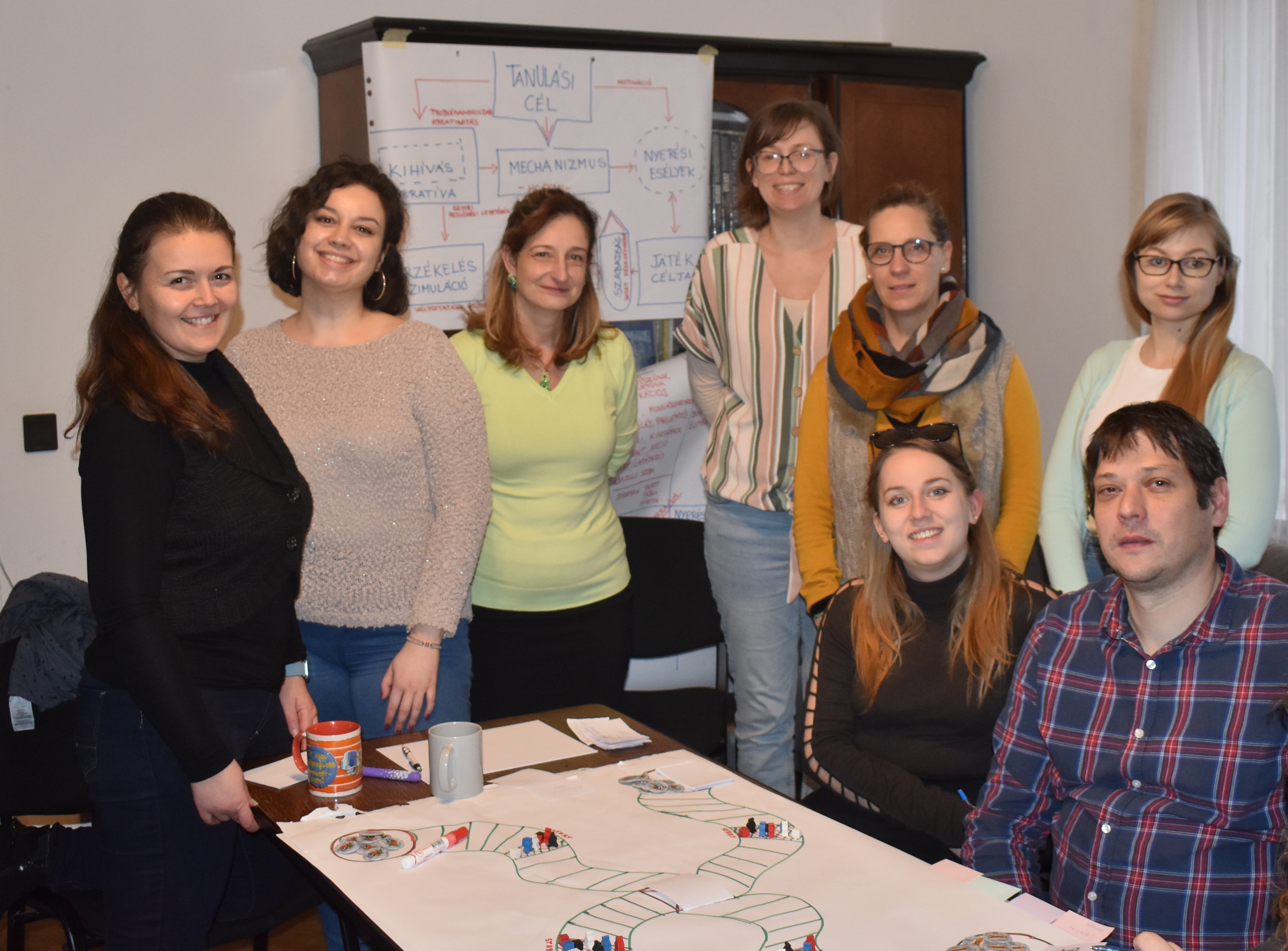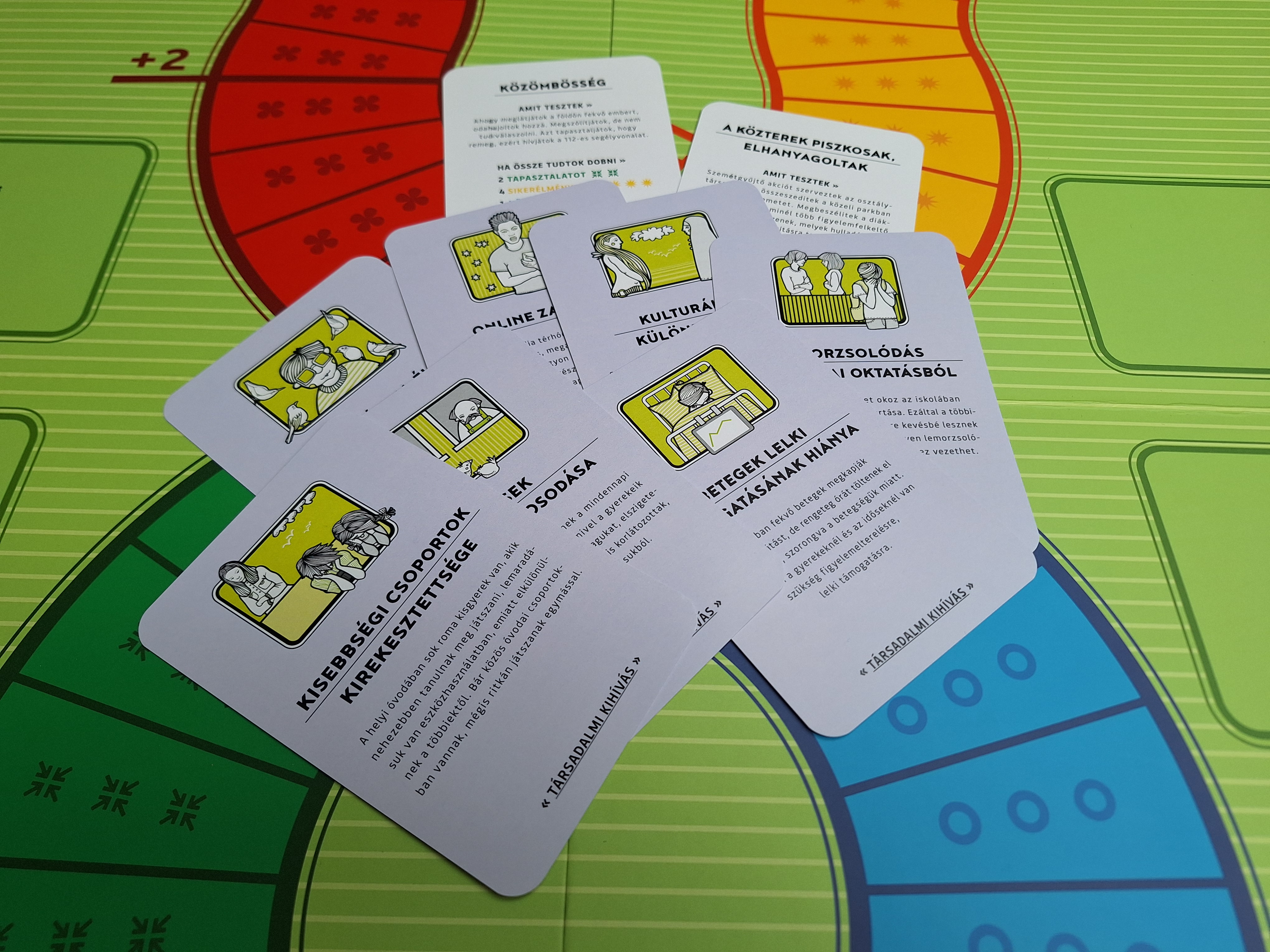
Raising awareness and commitment to volunteering and active social participation through gamification.
Draw a Card for Volunteering!
Awarded institution: Talentum Alapítvány (Talentum Foundation)
Project title: Draw a Card for Volunteering!
In 2025, the Talentum Foundation for the Support of Volunteering won the Erasmus+ Nívódíj (Excellence Award) with their project "Draw a Card for Volunteering!". Their aim was to inspire, sensitize, and engage young people in volunteering and social participation through the method of gamification. Hungarian and Romanian partner organizations jointly developed an educational board game and a methodological guide that highlight volunteer opportunities and social challenges. We spoke with Edit Balogh, president of the Talentum Foundation, about identifying and developing tools tailored to the target group and the impacts of the project.
What was the main goal of the project, and what needs triggered it?
The Talentum Foundation frequently visits high schools to promote volunteering. Over the years, it became clear that today’s youth desire increasingly modern and creative learning tools, and schools are also more open to innovative methods. While we have used cooperative and creative training tasks in classes and project days, we wanted to take a further step toward a fun yet educational approach - so we developed a board game.
The message of the board game titled VolunteerIN: THE CHANGE IS IN YOU… ARE YOU IN? is that volunteering is a diverse activity where everyone can find the most suitable form, time frame, and way of cooperating with the host organization. Individual volunteering helps us become more skilled and experienced, gaining resources that enable us to become active, influential members of society and help our communities, cities, and countries address social issues. We emphasize that individuals alone can achieve less than when they unite with others, thereby pooling their resources.
Please tell us about the activities you carried out!
A major value of the project was the partnership in developing the board game: Talentum Foundation staff acted as coordinators, while volunteer coordinators from Caritas Alba Iulia participated on the other side. The first phase involved analysing and designing the game: mapping out what form and game methodology could effectively represent volunteering and entertainingly convey values.
Content development followed, involving many dilemmas because we wanted to pack everything about volunteering into the game. We began prototyping with paper, markers, and candy pieces as pawns. We designed, tested, modified, and played repeatedly. The hardest part was crafting rules that were precise yet simple, aiming for a game that young people could easily understand.
Next came the design phase - it was important to work with a graphic designer who could artistically reflect the values of volunteering alongside a youthful spirit.

As the game’s content and look took shape, we started testing it in classrooms with high school students - still using candy pawns and homemade printed cards.
Students provided feedback in multiple rounds; they criticized and brainstormed ideas. We incorporated many valuable elements but had to acknowledge that each group and school had different opinions, so eventually we closed the process and declared the game finished.
Finally, the game was professionally printed, and the celebratory moment came when we started playing with the real, finished board game.
How did the project affect you personally?
The project strengthened the partnership between Talentum Foundation and Caritas Alba Iulia: besides work, we spent a lot of time playing together, which added an interesting dimension to the collaboration. We also experienced, as professional trainers and coordinators, how we need to adapt our tools and methods to work with youth. The development process demanded a high level of openness and attention from the game developers towards the young players.
| The game also brings a new dynamic to cooperation with schools, creating experiential learning spaces that are important methodological elements for today’s educational institutions. |
How did the project impact the local youth?
The young people involved in the project phases were proud to have their opinions asked and to work with us on professional issues. They took this very seriously.
| During testing, we consciously included high school, vocational school, rural and urban school students, and university students to get diverse perspectives. All groups consistently said that learning through experience freed their thinking, and they dared to debate and argue about volunteer situations. Different family backgrounds also brought varied viewpoints and attitudes to social questions. Everyone agreed that volunteering is a good method to address social issues and that young people can actively join these efforts. |
What was the most memorable moment of the project?
At the end of the project, after the board game had been printed, the team gathered independently on a trip in Transylvania at Șumuleu and played the game just for fun, recalling all the work, testing, and brainstorming. By then, we sat around the table as real players, laughing and freely enjoying the experience.

Who else can benefit from the project beyond the target group?
We recommend VolunteerIN: THE CHANGE IS IN YOU… ARE YOU IN? board game for youth workers, educators, trainers, counsellors, peer helpers, and volunteer coordinators working with young people who want to motivate their groups toward volunteering. The game has also found use in study trips, youth camps, or simply as card prompts to discuss social challenges and responses in community programs. The English version is available online, opening new possibilities for its use.
What are you most proud of about the project?
The board game is an experiential pedagogical tool embedded in a process, carrying a message that benefits from an accompanying debriefing part for greater impact. We created a methodological guide to deepen and discuss the topic, offering directions on the pedagogical processing of volunteering and social challenges. Our experience showed that gamified learning brings something new and engaging to youth, helping the conveyed message and knowledge hit their mark better.
| The game covers three main messages - the diversity of volunteering, the benefits and usefulness of volunteering and the feelings experienced through volunteering - which may not be fully realized by players in the heat of the game. The facilitator’s role afterward is to bring these experiences and attitudes from an experiential to a conscious level. |
Thus, users receive a gamification tool and methodology for promoting volunteering, which, with some imagination, can be applied in other contexts as well. For instance, it has proven useful in encouraging volunteering among people with disabilities or motivating seniors.
How did you share news about the project and its results?
After the release had been released, we launched extensive offline and online dissemination, presenting in schools, conferences, workshops, and advertising on social media platforms in both countries and across Europe. Project results are available on the websites of both organizations, on EPALE, and the ERASMUS+ Project Results Platform. Local TV even broadcast the news in Vojvodina, and based on information in the European CEV newsletter, we received inquiries from Portugal and Ireland about using the English version of the game.
What does winning the Erasmus+ Nívódíj (Excellence Award) mean to you?
It crowns the creation of a game that brought joy to every creator and proves that what we have brought to life is useful for young people. The Erasmus+ Excellence Award is both an obligation and an opportunity to disseminate the game widely, reaching more teachers and schools and ultimately encouraging youth to become more conscious and confident volunteers.
Photos: Talentum Foundation for the Support of Volunteering
Introducing the 2025 Erasmus+ Nívódíj (Excellence Award) Award-winning projects!
Utolsó módosítás: 2025.07.02.












